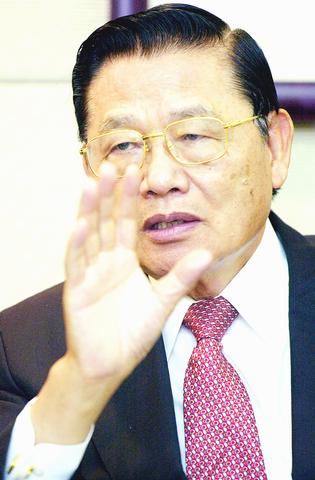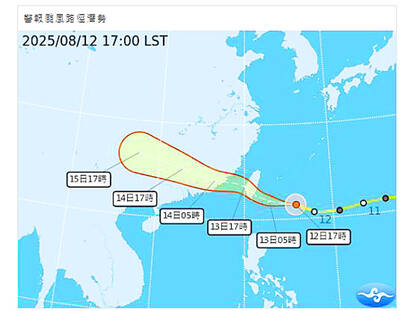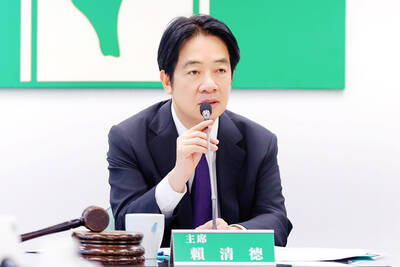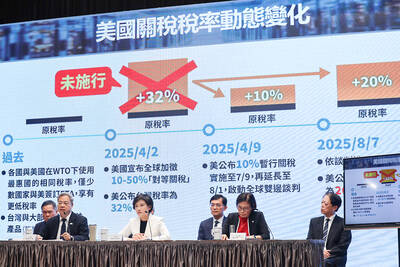Taipei Times: The president's Economic Development Advisory Conference closed last Sunday; how do you evaluate resolutions reached at the conference, compared to the KMT's ten recommendations proposed beforehand?
Chiang Ping-kun (

PHOTO: GEORGE TSORNG, TAIPEI TIMES
The labor law's deregulation was particularly hard to reach since it required workers to make concessions. Ever since former premier Hau Pei-tsun (
The country's current economic downturn appears to have contributed to the successful reaching of consensus [at the conference]. As for cross-strait trade policies, it was the KMT which promulgated the "no haste, be patient" policy, but the situation has changed now. When I worked at the Ministry of Economic Affairs, I proposed to open up point-to-point direct transportation (
However, the DPP, which is supposedly more conservative than the KMT regarding cross-strait issues, has now made a breakthrough in easing cross-strait trade barriers.
I think these two achievements highlighted success of the conference, which also provided an arena for cooperation between the ruling and opposition parties.
TT: With consensus reached on more than 300 proposals, how effectively will they be in promoting the country's economic recovery?
Chiang: The conference only addressed one-fifth of the country's economic problems. What remains is setting up a timetable to implement these proposals. Putting them into law is a difficult task since the next legislative session will only last for a month. However, I disagree with the idea of allowing all the legislation to enter the second reading by skipping the legislative committees' thorough review. Also, the likely electoral turnout at the end of the year will decide the country's future democratic development and the possibility of forming of a coalition government, which is a prerequisite for the country's political and economic stability.
TT: The government has decided to replace the "no haste, be patient" policy with a policy called "active openness, effective management" (
Chiang: The fact that investments in China increased by 108 percent last year shows that the ["no haste"] policy itself only works as an [abstract] strategy rather than a [practical] policy.
Yin Chung-wen (
It was not a policy, in the sense that it only placed restrictions on Chinese investments made by the conglomerates, instead of by medium and small-sized businesses.
Now that restrictions will be relaxed, I think that competitiveness should serve as a standard. For those businesses no longer competitive, exodus to China should be allowed, while those which still enjoy domestic competitiveness should "keep their roots in Taiwan" (
TT: What about "effective management?"
Chiang: The most effective way to manage [capital] is to improve Taiwan's investment environment so that businessmen can raise money and do their research and development here. It's inappropriate for the government to interfere with the market and order any corporations' R&D branches to stay in Taiwan.
On the other hand, the government should take advantage of Taiwan's geographic importance and business integration to attract both local and foreign investors, who should be educated to understand that doing business in China involves far more risk than in Taiwan.
A lot of Taiwanese now do business in China in a very clever way in order to keep their money out of China. They take orders and collect payments outside China, sending only what they need to cover costs into China itself.
But more importantly, Taiwan should play the role of a value-added center. As far as I understand, a few industries ship Chinese components back to Taiwan and assemble them into products made in Taiwan, whose prices are greater than products made in China.
The business model will work better if cross-strait shipments can be made directly to bypass Hong Kong. There are also [other] profitable business models. For example doing design work in Taiwan, manufacturing in China and selling products to other markets including the US. [Some businessmen] also strike deals with, say, IBM to produce products made with Chinese components and branded with IBM labels. This gets them better prices, for which they have to raise their standards of quality control.
These are business models that allow Taiwan to outshine other Asian countries and become a value-added center. Taiwan should now learn to make profits out of the marketing process, which Japan and the US used to be very good at.
Therefore, as Taiwan develops its offshore transshipment centers it should incorporate factories for export processing to create value-added business opportunities and job opportunities. The best way to protect Taiwan's security is to ensure its economy prospers -- making profits out of the booming Chinese market.
TT: Though many Taiwanese businessmen lauded the relaxation of the "no haste, be patient" policy, foreign investors, however, are less enthusiastic since direct links haven't been made possible. How urgent are direct links?
Chiang: A lot of international companies based in Taiwan have an eye on the China market. They can lower their costs dramatically if direct links are opened.
The same goes for Taiwanese businesses. Formosa Plastics Group Chairman Wang Yung-ching (王永慶) had previously said that, if direct links were allowed, he probably wouldn't have to transfer his business to China. Therefore, we've long proposed to open up direct links soon so as to facilitate Taiwanese businessmen's participation in the Chinese market without having to establish factories in China.
Direct commodity shipment across the Strait should be started before passenger transportation since all it takes is to annul regulations that require cross-strait trip detouring via third countries just for the purpose of getting their documents rubberstamped.
TT: After the trade policy is relaxed, what will be the major negative impact on Taiwan's economy?
Chiang: What worries me the most is the likelihood of hollowing out Taiwan's technologic capabilities. Exodus of Taiwanese capital to China has proven harmless to Taiwan's economy. For the past 15 years, Taiwan's exports have made a profit of NT$165 billion, mainly from trade in China. However, if China catches up with Taiwan in terms of technology, Taiwan may not be able to compete with it. Therefore, Taiwan should continue to develop its high-tech sector and other advanced industries.

GET TO SAFETY: Authorities were scrambling to evacuate nearly 700 people in Hualien County to prepare for overflow from a natural dam formed by a previous typhoon Typhoon Podul yesterday intensified and accelerated as it neared Taiwan, with the impact expected to be felt overnight, the Central Weather Administration (CWA) said, while the Directorate-General of Personnel Administration announced that schools and government offices in most areas of southern and eastern Taiwan would be closed today. The affected regions are Tainan, Kaohsiung and Chiayi City, and Yunlin, Chiayi, Pingtung, Hualien and Taitung counties, as well as the outlying Penghu County. As of 10pm last night, the storm was about 370km east-southeast of Taitung County, moving west-northwest at 27kph, CWA data showed. With a radius of 120km, Podul is carrying maximum sustained

Tropical Storm Podul strengthened into a typhoon at 8pm yesterday, the Central Weather Administration (CWA) said, with a sea warning to be issued late last night or early this morning. As of 8pm, the typhoon was 1,020km east of Oluanpi (鵝鑾鼻), Taiwan’s southernmost tip, moving west at 23kph. The storm carried maximum sustained winds of 119kph and gusts reaching 155kph, the CWA said. Based on the tropical storm’s trajectory, a land warning could be issued any time from midday today, it added. CWA forecaster Chang Chun-yao (張竣堯) said Podul is a fast-moving storm that is forecast to bring its heaviest rainfall and strongest

President William Lai (賴清德) yesterday criticized the nuclear energy referendum scheduled for Saturday next week, saying that holding the plebiscite before the government can conduct safety evaluations is a denial of the public’s right to make informed decisions. Lai, who is also the chairman of the Democratic Progressive Party (DPP), made the comments at the party’s Central Standing Committee meeting at its headquarters in Taipei. ‘NO’ “I will go to the ballot box on Saturday next week to cast a ‘no’ vote, as we all should do,” he said as he called on the public to reject the proposition to reactivate the decommissioned

TALKS CONTINUE: Although an agreement has not been reached with Washington, lowering the tariff from 32 percent to 20 percent is still progress, the vice premier said Taiwan would strive for a better US tariff rate in negotiations, with the goal being not just lowering the current 20-percent tariff rate, but also securing an exemption from tariff stacking, Vice Premier Cheng Li-chiun (鄭麗君) said yesterday. Cheng made the remarks at a news conference at the Executive Yuan explaining the new US tariffs and the government’s plans for supporting affected industries. US President Donald Trump on July 31 announced a new tariff rate of 20 percent on Taiwan’s exports to the US starting on Thursday last week, and the Office of Trade Negotiations on Friday confirmed that it